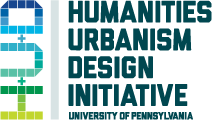News
H+U+D Annual Report 2017-18

For the past five years, we have been privileged to oversee the H+U+D initiative aiming to contribute new sensibilities and collaborations centered on humanities, urbanism and design (hence H+U+D) to Penn’s scholarly climate. As we have worked with faculty and students, promoting interdisciplinary scholarship and building social capital, we have also laid the groundwork a renewed Mellon-sponsored project, “The Inclusive City, Past, Present, Future” (H+U+D 2.0), that will, again bring together faculty and students from the Schools of Arts and Sciences and Design. We found that H+U+D has been successful in three areas that we will replicate, slightly modified in H+U+D 2.0. They are:
The first area, the signature H+U+D project, has been the interdisciplinary, multi-generational H+U+D Faculty Colloquium that met bi-weekly, sometimes around a seminar table and sometimes at a site or exhibition, to explore shared interests and discuss the work of its members. Participants included 36 Penn faculty at all levels of their careers, four visiting Junior (Postdoctoral) Fellows, and several associated postdocs (including two Marie Curie Fellows from the EU) who were already at Penn. The colloquium has been very successful in creating a supportive environment for younger scholars and connecting them with mentors and peers with whom they would not usually come into contact. The scholarly productivity of this group is impressive; to date they have produced 14 books, 9 chapters, 28 refereed journal articles, and 8 exhibitions.
The Colloquium has also hosted a small number of lectures and co-sponsored symposia. We have gone “on the road,” organizing interdisciplinary panels at scholarly conferences (most recently the “Sensing the City” at the last meeting of the Society for American City and Regional Planning Historians).
The second area has been in instruction. The H+U+D initiative sponsored 15 co-taught courses involving 35 faculty members and more than 150 students. These comprised 10 undergraduate “city seminars,” with international and domestic field trips, and an annual “problematics” seminar for graduate students.
The third area has been in research. H+U+D supported 27 undergraduate and graduate student research projects with results presented by the students to the Colloquium. The projects have yielded enriched doctoral dissertations, publications, notably one by an undergraduate in the Smithsonian Magazine, and inspired ongoing career choices and graduate studies.
As we look forward to the next step with “The Inclusive City, Past, Present, Future” (H+U+D 2.0) we will retain the basic structure but adding the thematic dimension focusing on inclusion and diversity both in what we study and who we are. The new project will have at its heart a renewed the Inclusive City Colloquium to explore how the humanities can inform the design professions and how the design professions can inform the humanities with a special focus on inclusion in its many forms. With the course sponsorship effort, we will give preference to courses that are co- taught, likely to reach a large audience, part of the College general education requirement and permanent “gateway” courses, designed to attract a large and more diverse undergraduate audience to the study of cities and the built environment generally. In this area, we will also initiate “Anchor Institution” seminars to take advantage of the opportunities that Philadelphia offers as a laboratory for the study of inclusion and diversity. Here we will select and work with one of Philadelphia’s “anchor” institutions to create the seminar. We expect that these seminars would offer students opportunities to study and work with collections, exhibition design, public programming, policy making and implementation, city planning, architectural design, and management. Finally, in the research arena, we will offer up to 12 graduate and undergraduate fellowships per year with undergraduates being offered a non-credit Undergraduate Student Research Colloquium to enrich their experience.
So the projects of the past five years have nurtured a remarkable treasury of human capital in the Schools of Arts and Sciences and Design as this report illustrates. The Mellon Foundation’s support has made a huge difference in the lives of faculty, undergraduate and graduate students at Penn, Moreover Mellon’s has been field- defining world-wide, seeding creativity and productivity in urban humanities among the many scholars of the participating universities Penn is proud to be among their number.
Click below to download the full report
